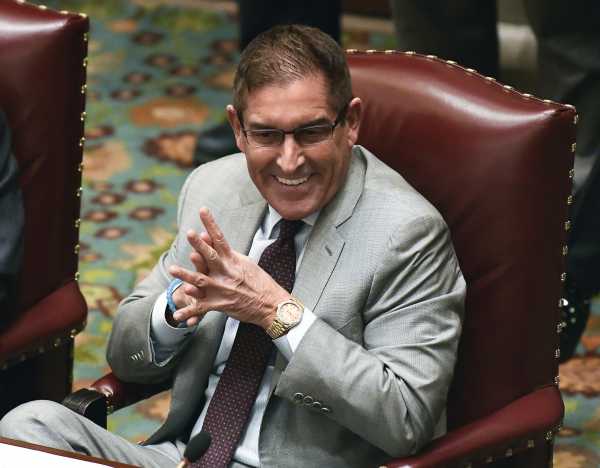
Alessandra Biaggi, a 32-year-old lawyer, unseated Democratic state Sen. Jeff Klein in Thursday’s New York primary.
Her campaign against Klein, a powerful seven-term incumbent who represents parts of the Bronx and Westchester, didn’t get the same media attention as some of the other insurgent campaigns in the state. But her victory still rocked New York politics.
So did the victories of five other Democratic challengers who, like Biaggi, took on a group of renegade Democrats who had broken off from their party and worked with Republicans in the state Senate in exchange for leadership positions and the accompanying perks. Klein founded this group in 2011, known as the Independent Democratic Conference (IDC).
The IDC eventually grew to eight members, including Klein. Six of them lost their jobs Thursday night. Two others survived their challenges.
There’s a catch: The IDC doesn’t actually exist anymore. It disbanded in April 2018 after the breakaway Dems brokered a deal to join the Democratic caucus for good.
But that wasn’t good enough for energized progressive voters, and on Thursday night they “exacted revenge of them for not caucusing with the Democrats this entire time,” as Craig Burnett, a political science professor at Hofstra University, put it.
This payback might have less to do with politics in New York’s state capital and more with the New Yorker in White House. The “blue wave” that’s igniting Democratic activists and motivating progressives to run for office across the country trickled down to normally sleepy state Senate races — and liberal voters’ impatience with middle-of-the-road Democrats.
“They woke up the progressive side,” Burnett said. “It’s been energized by events that are actually outside of the state of New York. And as a result, six out of eight them didn’t win their reelection bid.”
What is the IDC, and why did it exist?
New York has a reputation for being deep blue, but its politics on the state level are much more complex. The Independent Democratic Conference exploited those divisions to carve out power for itself and its members.
When Klein established the group in 2011, Republicans had a slim majority in the state Senate. Technically, the IDC was a separate beast — it caucused with itself but formed an alliance with Republicans, effectively shoring up the GOP’s control of the state Senate. In exchange, they got financial perks for themselves and their districts.
In 2012, Democrats retook the state Senate — or should have. The group of renegade Democrats struck a deal with Republicans, denying Democrats full control of the chamber. Klein, in return, got to share power with the GOP Senate majority leader at the time, Dean Skelos (who’s since been convicted for corruption). The arrangement attracted more Democratic defectors in time — if you can’t beat ’em, join ’em, basically.
The state Senate then became, particularly in the view of liberal critics, the place where progressive legislation went to die. The state’s lower chamber, the Assembly, is overwhelmingly held by Democrats. New York also had a Democratic governor, at the time — as now — Andrew Cuomo.
Incidentally, the rise of the IDC coincided with Cuomo’s election to the governorship, and his critics had long argued he hadn’t done enough to force the rogue Democrats back into the fold or put real effort behind trying to unseat them. The thinking went that Cuomo didn’t mind having the IDC hanging around, as it gave him coverage to govern as a pragmatic, dealmaking centrist Democrat who once might have been an attractive presidential candidate.
But a few things happened to shake the power-sharing structure in Albany, including the awakened progressive activism across the country in the wake of Trump’s election. That put more pressure on the IDC, which started to see real activism brewing around their disloyalty. Susan Kang, a co-founder and spokesperson for No IDC NY, a group founded in 2017 to target these incumbents put it this way: the sense among progressives was that “this is not okay. You can’t join with Republicans when Trump is in power.”
It also put more pressure on Cuomo, whose liberal critics started to get louder. The governor also got a high-profile challenger in Cynthia Nixon, the actress and activist who attacked Cuomo from the left.
Though Nixon’s bid came up short on Thursday, she shook up up the gubernatorial race, and New York politics. And in April, after seven years, Cuomo brokered a deal — reportedly all it took was cookies and coffee at a Manhattan steakhouse — to dissolve the IDC and bring most of the Democrats back into the fold ahead of a critical April special election.
Democrats still were one vote shy of a majority in the Senate, courtesy of another rouge Democrat from Brooklyn, state Sen. Simcha Felder, who caucused with the Republicans and refused to rejoin the Democrats. (He’s not technically part of the IDC.)
But otherwise, all had been forgiven between the IDC and the regular Democrats. In exchange for agreeing to return to the fold, the Democrats agreed to pull financial support for any primary challengers, and they’d receive backing and support, including from Cuomo.
Progressive voters, it turns out, felt differently.
The IDC bloodbath, and what it might mean for New York’s politics moving forward
Biaggi defeated Klein, who spent nearly $2 million to defend his seat (to her less than $300,000.) Robert Jackson, an African-American former City Council member, defeated Marisol Alcantara (D-Manhattan). John Liu, a former city comptroller and mayoral candidate, defeated Tony Avella (D-Queens). Activist Zellnor Myrie defeated Jesse Hamilton (D-Brooklyn). Jessica Ramos, a former de Blasio aide, defeated Jose Peralta (D-Queens), and Rachel May defeated David Valesky (D-Syracuse) in the one upstate race.
Just two survived: David Carlucci (D-Rockland) and Diane Savino (D-Staten Island). Felder, the other breakaway who didn’t rejoin the Democrats in April, also survived his first primary challenge against Blake Morris.
These candidates were helped by a restless national mood among progressives that’s being driven by grassroots activism and antipathy for President Trump.
“They made a very strong message which said, ‘These are Democrats. They behave like Republicans and they should be voted out,’” Christina Greer, a professor of political science at Fordham University, said. “And I think in this political moment, especially in national politics, that was a really powerful statement for a lot of Democratic voters.”
In this way, New York’s weird two-track primary schedule may have helped. New York holds its federal primaries in June, which saw upstart democratic socialist Alexandria Ocasio-Cortez take down Joe Crowley, a top Democrat in the House and a powerful figure in Queens politics. It was both an omen and a sign that these insurgency campaigns could win.
“People were really excited to get involved after that [Ocasio-Cortez] win,” Kang said of the response. She said it brought attention to challengers already in the race, and some even jumped in last minute, including Liu, who rushed to get signatures to get on the ballot.
“Jeff Klein,” Kang added, seemed “as impossible to take out in everyone’s mind as Crowley.”
Until he wasn’t.
But for now, the IDC defeat doesn’t do much to change the practical politics in Albany. Democrats have been replaced by progressive Democrats, and the effect that will have on the upcoming general election in November is hard to gauge. Democrats will need to defend all their seats and flip a few vulnerable GOP districts — very possible, but not exactly easy. If they do retake the Senate, it’s also likely it will be by just a few seats, not an overwhelming majority.
They might be helped by Cuomo this time around, who just won renomination for a third term and is likely setting his sights on 2020. He didn’t seem to take the defeat of the IDC as a warning; rather, he told reporters it was “rearranging the deck chairs.” But he’ll likely be eager to prove his progressive credentials this time around.
“We don’t really know what’s going to happen until the November election,” Greer said. “But I am curious to see how Cuomo deals with this new reality.”
Sourse: vox.com






